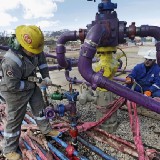The Fourth Circuit Court of Appeals on Thursday overturned a lower court’s ruling and determined that the Environmental Protection Agency (EPA) is appropriately analyzing the economic impact of regulations under the Clean Air Act.
The case was originally brought by Murray Energy Corporation and a group of subsidiaries and other coal companies, who alleged that the EPA failed to adequately report on how many coal jobs could be or were being lost due to Clean Air Act regulations. West Virginia and 12 other states intervened on behalf of the coal company.
John Walke, director of the Clean Air Project at the Natural Resources Defense Council, said the original case was unprecedented.
“I think this court decision should stifle any future attempts by corporations to go to court to enforce generally programmatic responsibilities by the EPA,” he said. “An avenue for abuse and consumption of resources has been cut off.”
The EPA is required by Congress to “conduct continuing evaluations of potential loss or shifts of employment which may result from the administration or enforcement” of its regulations under the Clean Air Act. But the Fourth Circuit’s decision found that Congress specifically intended to protect against judges meddling in the agency’s “complex” processes. It also found that the EPA’s requirements are “broad” and “open-ended.”
“The EPA is thus left with considerable discretion,” the court said in its ruling. “A court is ill-equipped to supervise this continuous, complex process.”
This ruling overturns one by the U.S. District Court for the Northern District of West Virginia, which directed the EPA to conduct a specific jobs analysis. That report was due July 1.
Murray Energy had initially requested that EPA rules, including the Clean Power Plan, which seeks to limit carbon emissions from power plants, and the Mercury Rule, which seeks to reduce mercury emissions, be put on hold while the EPA conducted a lengthy, industry-specific jobs analysis.
“Even the badly wrong district court judge agreed that EPA rules should not be blocked,” Walke noted.
Still, the case reportedly cost the EPA millions of dollars in taxpayer money, while 110 employees were working to produce the ordered report, which EPA had argued would take years to complete.
“This lawsuit was essentially an abuse of the courts to take over the agency’s resources and agenda to divert vast numbers of staff to responding to a discovery request,” Walke said. “Fortunately, the court found that it was utterly baseless.”
The case appears to have been a bridge too far even for former Oklahoma Attorney General Scott Pruitt, whose state joined Murray Energy on other lawsuits against the EPA. Pruitt now serves as EPA administrator, and in his new role, he has repeatedly capitulated to industry demands, choosing to weigh purported jobs and economic burden over health concerns. Earlier this year, Pruitt’s EPA conceded that a two-year delay in implementing methane rules, also under the Clean Air Act, would have an impact on children’s health. The agency nevertheless went forward with the delay.
In this case, though, the agency continued its appeal.
“President Trump’s EPA will take the economic and job impacts of its proposed regulations into account consistent with its statutory requirements, regardless of the outcome of this particular case,” EPA spokesperson Amy Graham said in an emailed statement to ThinkProgress.
The owner of the Murray Energy Corporation, which brought the case in 2014, Robert Murray has made a name for himself as a staunch opponent to the EPA, blaming the agency, which is tasked with protecting the nation from environmental contaminants and tasked with protecting the environment from people, for his industry’s woes.
Murray Energy has also sued the Department of Labor over a coal dust rule intended to protect miners from black lung. The company also joined a lawsuit challenging the Clean Water Rule.
It’s true that coal jobs have fallen dramatically in the United States, but most analysts suggest that the industry’s slow demise has been driven by a combination of mechanization and — especially in recent years — cheap natural gas.
Meanwhile, coal has an outsized impact on the country’s air, water, and climate. Coal is a leading contributor to greenhouse gas emissions, while mountaintop removal, coal ash, and airborne pollution all have negative effects on human health and the environment.

